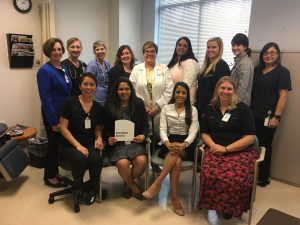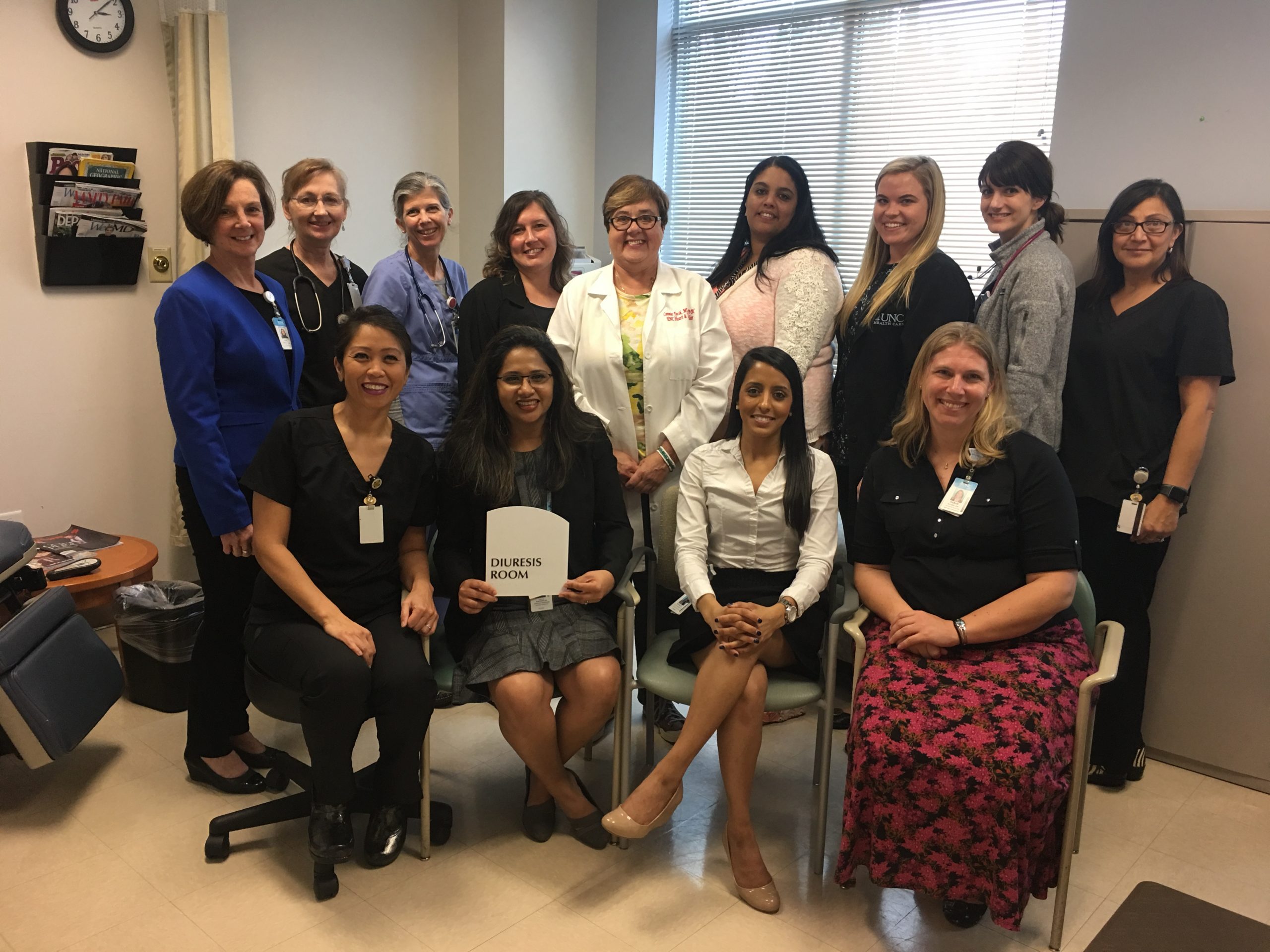The newest project from the department of medicine’s Value Care Action Group (VCAG) is better serving patients with early heart failure while also reducing visits to the ED and subsequent hospitalizations.

The newest project from the department of medicine’s Value Care Action Group (VCAG) is better serving patients with early heart failure while also reducing visits to the ED and subsequent hospitalizations.

by Kim Morris, UNC Department of Medicine
Fiscal incentives to reduce the burden of hospital admissions have fueled interest in ambulatory strategies that can better manage heart failure, including clinic-based administration of IV diuretics. Heart failure is recognized as the leading cause of 30-day readmissions, and the Center for Medicaid/Medicare Services charges a penalty for heart failure readmission rates over 22%.
Since hospitalizations typically result from worsening congestion, intravenous loop diuretics are administered in 90% of hospitalized patients. Yet, for a large proportion of patients, who have gut edema, diuretic medicines are ineffective, and not easily absorbed. Historically, patients needing intravenous (IV) diuresis have presented to the ED for this treatment, and many are then admitted. Only 15-20% of these patients, with a diagnosis of heart failure, are discharged home.
When Dr. Thelsa Weickert, joined UNC’s cardiology inpatient service in 2016–after directing the advanced heart failure clinic at Southeast Permanente Medical Group in Atlanta–she expressed interest in quality improvement initiatives. She was soon introduced to the department of medicine’s Value Care Action Group, that encourages each division to review current practices for improvements. Weickert had an idea for a multidisciplinary ambulatory diuresis clinic, and she presented it to Dr. Darren Dewalt, who leads VCAG, and Dr. Patricia Chang, the director of UNC’s Heart Failure and Transplant Program.
“Everyone thought it was a good co-management model, primarily managed by nurse practitioners and clinic nurses,” said Weickert. “Physicians liked it because having the mid-levels see the patients in an acute setting gave the patients more access to care. Also, an open communication model between the mid-level and the primary cardiologist offered a more cohesive care approach to these complex patients.”
Six-week Pilot
Last summer, Carrie Neal, RN, selected 10 established patients with advanced heart failure from the UNC Meadowmont Heart and Vascular Center. Over a six-week period, these patients received diuresis outpatient services. The new delivery model helped the patients manage their heart failure exacerbations in the outpatient arena, and their response was overwhelming positive. One patient was able to go on vacation the same weekend after diuresis. Another with extreme hospital anxiety was glad to discover an alternative. In the end, the clinic team was able to successfully prevent heart failure readmissions over 30 days. The pilot proved the model was feasible, effective and safe.
“Everyone was so glad to have this option, especially because they didn’t have to go to the ED or the hospital and wait for hours. This was much more convenient.”
New Diuresis Clinic Opens
On November 6, 2017, a one-room clinic at UNC Hospitals Heart and Vascular Center at Meadowmont officially opened with two diuresis chairs. A multidisciplinary team of nurse practitioners, pharmacists, and nurses are now providing a comprehensive package of services to patients with advanced heart failure, along with ancillary resources such as pharmacy, nutrition and medical social worker support, with physician oversight. Patients are typically scheduled for same-day or next-day treatment, and rebooked for repeat visits as needed. A dedicated nurse provides direct patient care with supervision from a specialized nurse practitioner.
From a clinical outcomes standpoint, Weickert believes the clinic will improve 30-day readmission rates over time. She also believes it will impact the length of stay for cardiology patients admitted to UNC Medical Center.
“For a number of patients, we have already been able to facilitate earlier hospital discharges because we were able to continue to serve their diuresis needs in the outpatient setting. This enabled us to reduce some inpatient hospital stays by as much as 2-3 days.”
By not only reducing cost, the shifting of care to an outpatient setting means there are fewer visits to the ED and subsequent hospitalizations. From a patient perspective, this has resulted in heart failure symptoms being much better controlled. It is also better for UNC Medical Center because the clinic improves ED and inpatient bed utilization.
“The real kudos go to all of the staff in our clinic. Advanced practice providers Connie Fecik, NP, Sarah Waters, NP, and Cassie Ramm, NP, the Meadowmont cardiology nursing staff and our pharmacist, Sonalie Patel, PharmD, were integral to the success of this project,” said Weickert. “In an increasingly resource-constrained environment, we believe this clinic successfully reduces the need for hospitalization of stable heart failure patients at a substantial cost savings. But most importantly, we are doing right by our patients!”
As of March, 2018, the clinic had successfully served 51 unique patients who underwent 86 discrete treatment visits. The clinic has also expanded to a larger space, with three diuresis beds that can serve up to six patients in one day. Clinic manager Christina Colucci, NP, played an instrumental role in the continued expansion. Transplant cardiologist Mirnela Byku, MD, will also be joining the team.
This project is one of many Value Care Action Group improvement efforts taken up by the department of medicine. Dr. Ronald Falk, chair of the department created the group in 2016. Champions in each medicine division are encouraging the review of current practices, looking for improvements for high-value outcomes in healthcare. High-value is defined by the quality of patient-centered care achieved per unit of cost.